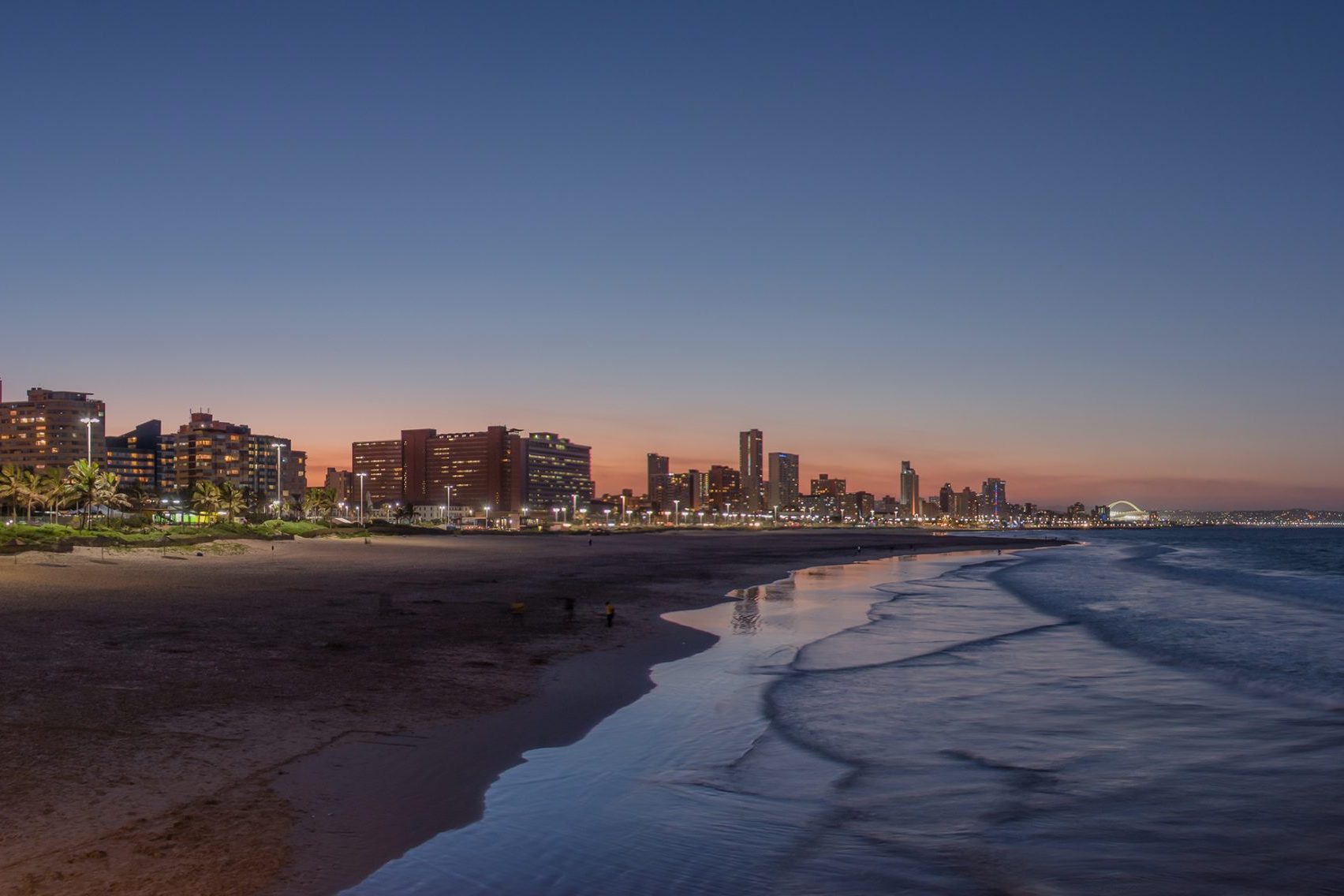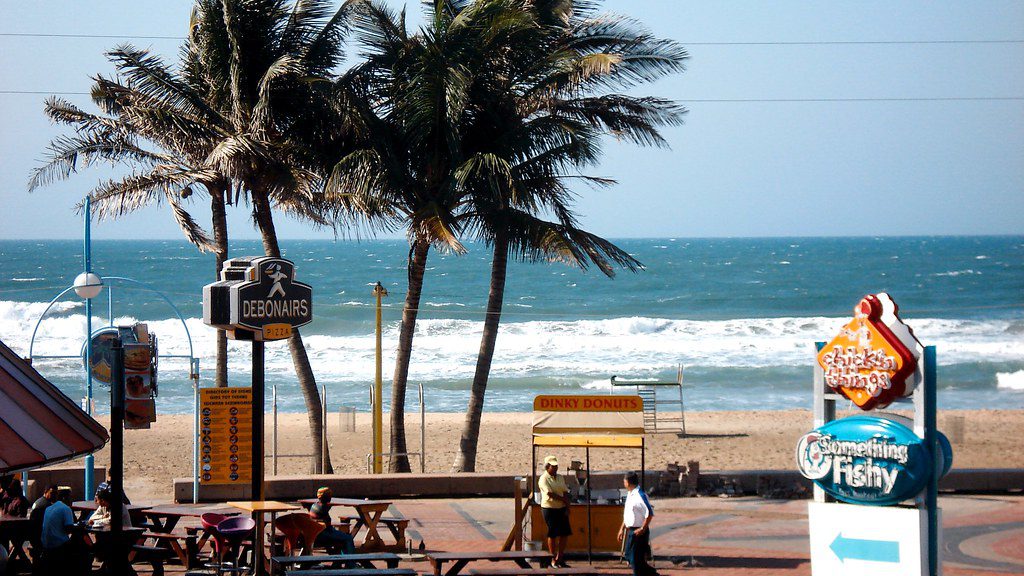Skift Take
Durban was a rare source of growth for South Africa's tourism economy in 2019, but leaders have to be vigilant against an early reopening of international borders sparking a case surge and becoming a drag on the region's reputation.
 This series of stories will profile mid-sized and smaller cities across the globe, highlighting the depth of challenges from the pandemic to their travel economies, as hotels, airlines, airports, and tourism-related enterprises, especially small businesses, struggle to keep going.
This series of stories will profile mid-sized and smaller cities across the globe, highlighting the depth of challenges from the pandemic to their travel economies, as hotels, airlines, airports, and tourism-related enterprises, especially small businesses, struggle to keep going.
South Africa reopened its borders to international travelers earlier this month, as travel leaders in a city on the country’s eastern coast argue tourism is crucial to delivering the country a full economic recovery from the coronavirus pandemic.
Durban — South Africa’s third-largest city — may not be as historically popular with tourists as Cape Town or Johannesburg. But the metropolitan area, with roughly 3.7 million people, was a pre-pandemic tourism bright spot at a time when inbound tourism into South Africa was on the decline.
While Durban wasn’t spared from the pandemic, business leaders are optimistic reopening borders can deliver an accelerated recovery timeline without running the risk of losing control of the virus.
“We need this tourism. That’s all we’ve been trying to say. It’s not a bad call. Just make sure Americans come with certificates saying they don’t have the disease — just like they’ve been strict with us on Ebola,” said Lee Zamekile Zama, CEO of the Federated Hospitality Association of South Africa. “We do believe if there’s any growth in the South African industry, it can only come from tourism. It has the greatest potential to bounce back from this compared to most industries.”
International tourism to South Africa was down nearly 12 percent in 2019, sparked by reports of crime, a drought in the Western Cape province — home to Cape Town —and even the growing tourist appeal of other African countries like Namibia and Ethiopia.
Durban bucked the trend. The Kwazulu-Natal province where Durban is located saw international tourist arrivals increase by more than 17 percent in 2019, according to the organization South African Tourism. But the growth momentum wasn’t enough to offset the worst year on record for travel.
South Africa and other African countries have generally fared better during the pandemic than places like the U.S. and countries in Europe. South Africa’s 745,000-case total, as of Nov. 13, puts it between Iran and Germany and well below the 10.6 million cases reported so far in the U.S. But Durban officials agreed with the South African government that a national lockdown was the best approach in combatting the spread of the virus earlier this year.
There are U.S.-led travel mitigation procedures from the Western Africa Ebola virus epidemic that South Africa could now utilize on Americans and other tourists from heavily impacted countries during coronavirus. The U.S. imposed restrictions on arriving travelers from Africa to go through specific airports in cities like Atlanta and New York City for testing, screening, and questioning regarding Ebola.
It should be noted that South Africa was less impacted from Ebola than countries much further to the north like Uganda and South Sudan. But South African can still leverage lessons from that epidemic in restoring its much-needed appeal as an international tourist destination post-Covid.
“Every tourism sector in total had already seen massive cancellations way before the government made the announcement,” Zama said. “We did not want to be left behind if the rest of the world was recovering and we were still struggling. Half of our revenue comes from international markets.”
‘Basically, All Hell Broke Loose’
The team at Durban’s King Shaka International Airport had every reason to look forward to 2020. May would mark the 10th anniversary of the airport opening in time for the 2010 FIFA World Cup, and the facility had just handled 6 million passengers in a year — nearly 2 million more passengers than it handled in its first year of business.
The city’s hotel industry rode into the new year with its own positive momentum of increasing room nights from international visitors.
“Around December time last year was when I had first heard about the outbreak in China,” said Vikram Jamwal, general manager of the Hilton Durban. “I had no idea it would spread as quickly as it did and would never have thought it would make its way here.”
The country’s outlook changed on March 1, when South Africa’s first confirmed case of coronavirus appeared via an arriving passenger from Italy at the Durban airport.
“I can clearly remember where I was when I got the call. I needed to take a breath,” said Colin Naidoo, senior manager at King Shaka International Airport. “Basically, all hell broke loose, and we needed to get more information.”
While the world was beginning to grapple with the virus and its global impact in early March, the worst of it was still relatively contained to China and other parts of Asia, Iran, and Italy. But the arrival to South Africa sent airport officials into a flurry of mitigation measures.
“You had to unlearn those things you took for granted,” Naidoo said. “Changing the way we operate became the new normal very soon. We’re still reeling from that.”
Closed borders meant an airport that once handled as many as 20,000 passengers a day was now a ghost town. Masks are now required, surfaces are rigorously sanitized, and only passengers are allowed within a terminal building. Less than a third of the airport’s 4,000-person staff were working during the lowest point of the pandemic, Naidoo said.
“We had to take funds for what you’d use for normal purposes to support Covid-19 regulations,” Naidoo said. “We had to take a sobering thought on all our projects: is it necessary now, or can it wait?”
Shut Down Swiftly and Wait
Travel organizations like FEDHASA and the Durban airport may have been clued into looming shutdowns, but small businesses without direct lines to the government didn’t have that luxury. The government gave three days’ notice ahead of a three-week national lockdown in late March that later grew to five weeks.
“There was not nearly enough time to prepare, and we lost a substantial amount of stock,” said Bill Budd, owner of Shak Restaurants in South Africa and Mozambique. “The handling of the lockdown was abysmal.”
Budd was only able to retain a third of his staff and, like many restaurant and hotel owners around the world, came to the realization it can be cheaper to keep a venue closed than take on the higher costs associated with reopening to a low demand environment.
The South African government’s national lockdown in late March upended the yearly outlook by Derryck Myers, managing director at Butcher Boys Prime Steakhouse. He anticipated as much as a 15 percent improvement of business heading into 2020 compared to an unexpected five-week lockdown. The high-end steakhouse saw no income from late March through late August, as the concept isn’t conducive to take-out service.
But there were at least some levels of federal relief, in the form of employee payment assistance grants to handle unemployment benefits and avoid layoffs.
“We were fortunate enough that, although we were unable to pay staff full wages and salaries, we did not [lay off] any staff members,” Myers said. “[Temporary employer/employee relief], once it came through, helped us and our staff survive this period.”
The government’s salary buffers were among several relief measures offered to South African businesses, Zama added. There were debt relief funds and low-interest loans, but funding was limited relative to the high volume of applicants.
Others say the government coronavirus relief programs are yet another reminder of South Africa’s longstanding racial tension.
“Government assistance has not been forthcoming and denied to many on the basis of skin color,” Budd said.
Restaurateurs like Myers avoided taking on more debt with a government loan, given the uncertain demand environment for years to come. Instead, he worked directly with his bank and landlord during the crisis.
“It wasn’t easy, but we had built up fairly decent reserves and entered into negotiations with our creditors, who were understanding,” Myers said. “Our landlords also chipped in and helped us through this horror movie.”
Forging Ahead
South African President Cyril Ramaphosa’s November 11 address to the nation reopened the country’s international borders as long as arriving tourists showed proof of testing negative for the virus. The leader also acknowledged a resurgence of coronavirus in regions like the Eastern Cape and that the number of new cases was on the rise.
But Durban’s travel leaders noted before Ramaphosa’s announcement that a travel recovery was already underway in their part of the country.
“As soon as they allowed intra-provincial travel [in the domestic reopening process], people were shooting out and driving to the lodges in the bush just to get out of [Johannesburg],” Zama said. “Because they can drive to Durban, they came here, too.”
Drive-to and leisure travel led the recovery around the world, and it was no different in South Africa. Durban benefitted from its relative convenience to Johannesburg. The coastal city is a six-hour drive from South Africa’s largest city while Cape Town is 13 hours away.
“Johannesburg is the biggest source market for domestic tourism, but we still have many problems,” Zama added.
Average hotel occupancy in South Africa in September — the most recent month where data was available — was just over 27 percent, according to STR. That is a catastrophic plummet from the nearly 68 percent occupancy seen in February but a marked improvement from the just shy of 18 percent seen in June.
“As business and occupancy has slowed down, the hotel has had to fall in line with pandemic protocols,” Jamwal said of the local Hilton. “We have had to minimize our staff because we are not running on a full guest basis. I am confident that when business returns and we will for sure [call those employees back].”
Hilton properties around the world have marketed their heightened CleanStay and EventReady health and safety regimens as a way to book a stay or meeting at a Hilton property. Other businesses are similarly adapting to accommodate what dining and travel demand there is.
Butcher Boys enacted their own level of heightened cleaning and social distancing measures and relied on word of mouth from returning customers to help drive the message the dining room was still a safe place to visit. Shak Restaurants expanded into the overnight experience sector with an upscale “tented camp experience and activities,” Budd said.
“I don’t think there will be a return to the ‘old normal.’ Habits and attitudes have changed,” he added. “In many ways, it’s for the good: Go back to the basics, be more experimental, network, and collaborate for excellence in targeting niche markets.”
Have a confidential tip for Skift? Get in touch
Tags: coronavirus, ebola, second city survival diaries, south africa, tourism
Photo credit: Durban, South Africa, wants to get back to 2019 growth mode (a rarity in South Africa) as quickly as possible. Paul Saad / Flickr

